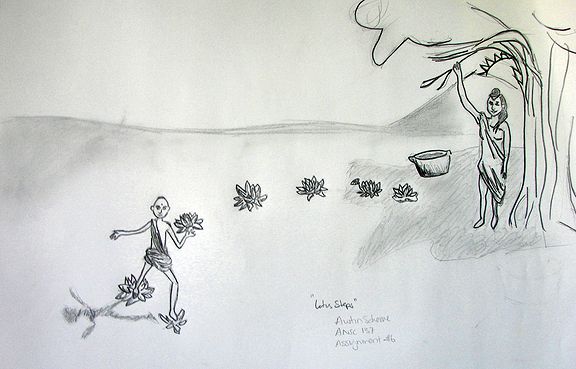
He walked for seven steps, leaving seven lotus prints where he stepped.
Drawing by Austin Scheiwe, Eleanor Roosevelt College (UCSD), Class of 2009, by permission
Not far from Jiāpí-luó there lived a band of sages (xiānrén 仙人) practicing austerities (xiūdào 修道), and among them a very elderly one named Ēsī-tuó 阿私陀, who was much respected by all the kingdom. When Ēsī-tuó learned that a prince had been born, he went to the palace where, seeing that the child was quite out of the ordinary, he both smiled in delight and shed a tear. He explained to the startled King Jìngfàn 净饭 that the child would some day become a great teacher, but Ēsī-tuó himself would not live long enough to study with him.

When the prince was five days old, King Jìngfàn called in his wise men to give him a felicitous name. They selected Xīdá-duō 悉达多 Siddhartha, which meant something like "Success in all that is done with courage." And, telling his fortune, they predicted that should he become a king, he would become a great and just king. But should he become an ascetic, he would become a buddha. One younger seer added that when he grew up, Prince Xīdá-duō was sure to forego the throne, leave his family, experience the Great Enlightenment (dàjué 大觉), and become the world's greatest religious teacher).
All the people hoped that the prince would grow up to be a wise king. So, of course, did King Jìngfàn. He certainly did not aspire to have his son leave his family and become a religious teacher. He hoped he would become king, would father children, and would continue the royal line.
Two days after the prince received his name, Queen Móyé abruptly took sick and died. And all the kingdom mourned because she was the first among the royal wives.
The prince was put into the keeping of his mother's sister, a court lady named Móhē-bōshé-bōtí 摩诃波阇波提, who raised him as she would her own son. And this is how it came to be that Prince Xīdá-duō never knew his own mother's face.